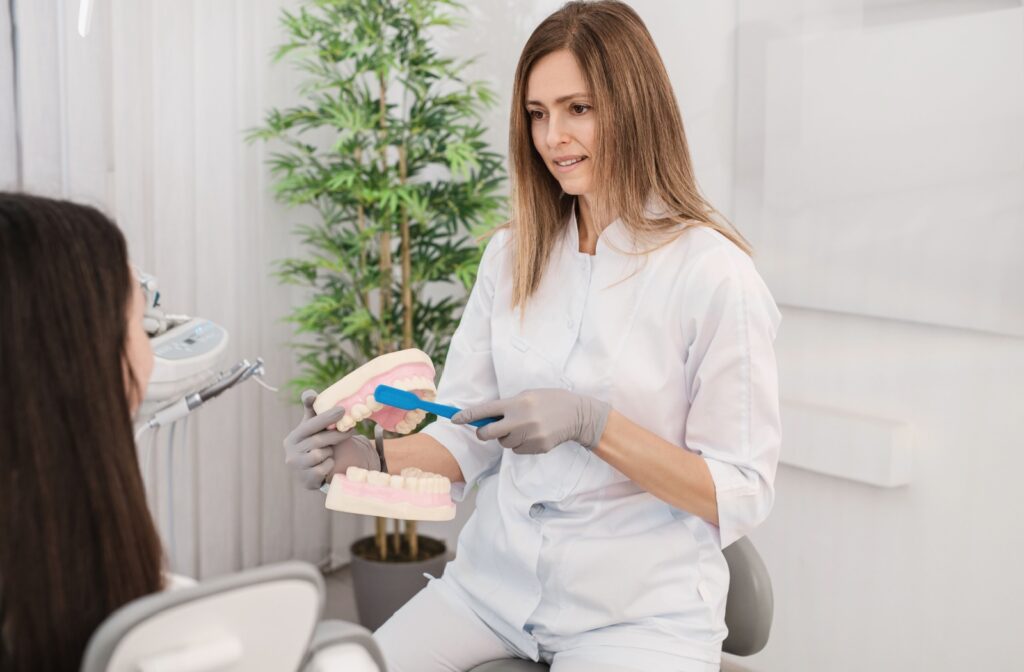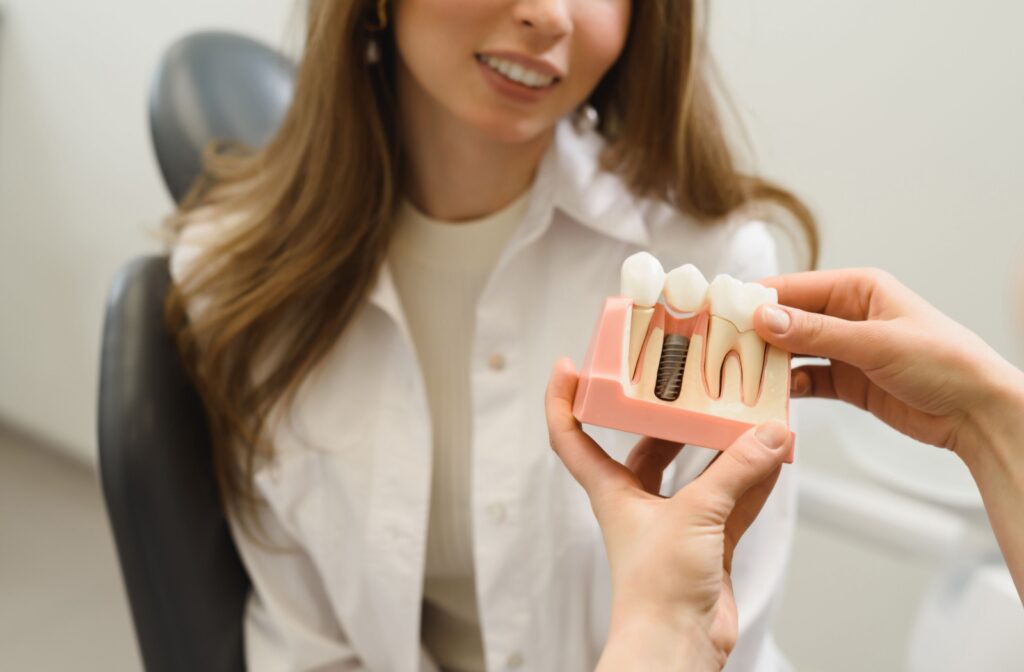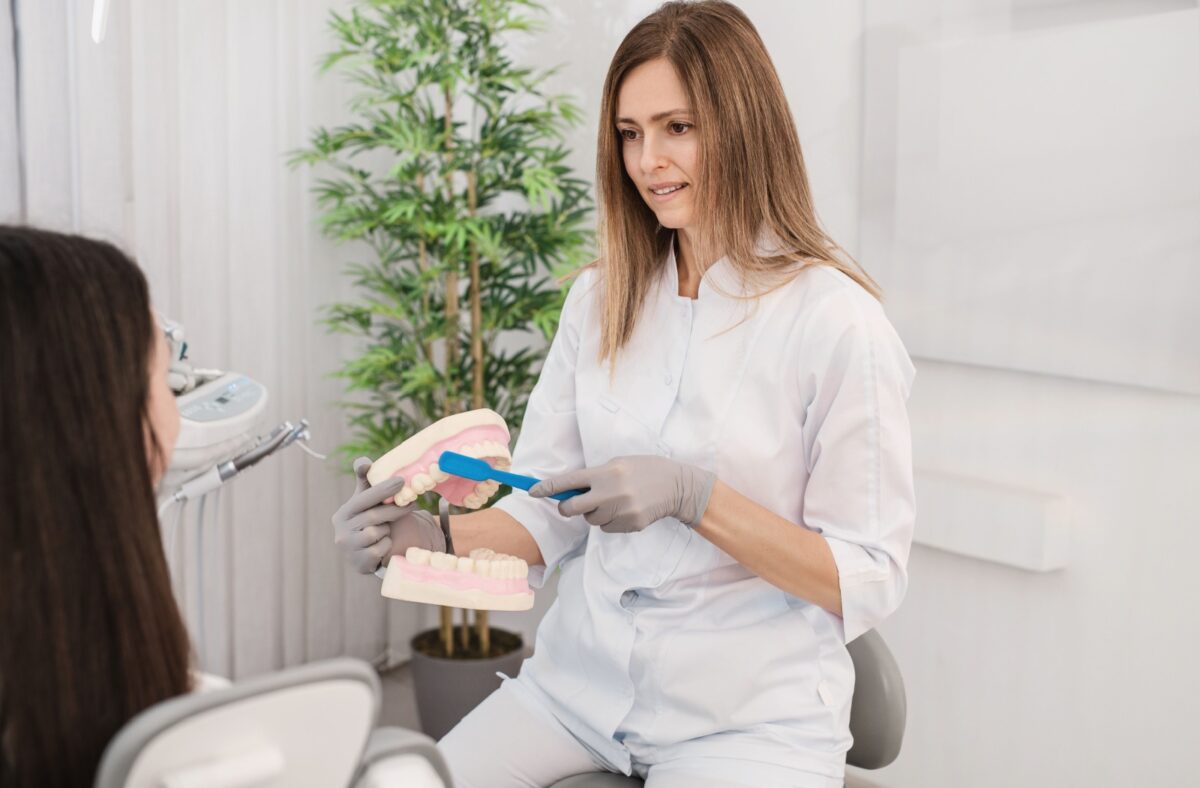
Dental implants can be life-changing, providing a durable, natural-looking solution for missing teeth. The success and healing of your dental implants rely heavily on proper aftercare.
When preparing for or recovering from a dental implant procedure, you’ll want to understand the dos and don’ts for effective healing. Tips for dental implant aftercare include the following considerations:
- Immediate post-op care
- Managing discomfort & swelling
- Dietary guidelines
- Oral hygiene practices
Following these helpful practices can reduce discomfort, minimize the risk of complications, and support the longevity of your new smile.
Why Dental Implant Aftercare Matters
Dental implants require both your commitment and care during the healing process. Here’s why following your dentist’s aftercare instructions is crucial:
- Proper aftercare helps the surgical site heal without delays or complications
- Good oral hygiene and post-op care minimize exposure to bacteria to help prevent infection
- Dental implants rely on the jawbone fusing to the implant, & poor aftercare can hinder progress & increase the risk of implant failure
How to Heal Faster After Dental Implants
How quickly you recover can depend on a few factors, and the good news is that you have some control over key aspects. Follow these tips to help heal faster and more effectively:
- Follow your dentist’s instructions, as they can provide personalized recommendations to support your recovery.
- Avoid smoking or using tobacco, as they delay healing, reduce blood flow, & increase the risk of complications
- Eat a nutrient-rich diet that incorporates foods high in vitamin C & calcium to promote wound healing & support bone health
- Get enough sleep, as rest helps the body repair itself more efficiently
- Manage stress through relaxation techniques, meditation, reading, or gentle hobbies, as high stress levels can impact the immune system & slow healing
4 Dental Implant Aftercare Tips
Here are 4 actionable tips to support faster healing following your dental implant placement.
It’s also crucial to remember that the most valuable guidance you’ll receive with any of these tips is from your dentist. They have the most in-depth knowledge of your unique case and can provide personalized instructions for your recovery process.
Immediate Post-Op Care
The first 24–48 hours after surgery are critical. During this time, follow these steps to protect the implant site.
Control Bleeding
Mild bleeding is normal. Your dentist will likely provide gauze pads to bite down on, which helps with clotting. Change the gauze as needed and as instructed by your dentist.
Avoid Aggressive Rinsing
Gargling or excessive swishing can disturb the blood clot around the implant site. Instead, gently rinse with salt water after 24 hours.
Rest & Relax
Avoid strenuous activities and allow your body to heal. Use an extra pillow at night to keep your head elevated and reduce swelling.

Managing Discomfort & Swelling
Discomfort and swelling are expected after dental implant surgery but can be effectively managed with the following:
- Over-the-counter pain relief medications like ibuprofen or acetaminophen, as directed by your dentist
- Cold compresses, such as ice or cold gel packs, to help reduce swelling during the first 48 hours; apply for 15 minutes & take 15-minute breaks
- Regular hydration to avoid dehydration & delayed healing; however, avoid using straws, as the suction can disrupt healing or dislodge clots
Dietary Guidelines
What you eat during your recovery can impact the success of your dental implants. Follow these dietary tips:
- Eat soft foods like yogurt, mashed potatoes, scrambled eggs, applesauce, & smoothies
- Avoid hot or spicy food that can irritate the surgical site & worsen swelling
- Skip sticky, crunchy, or hard items like chips, nuts, or caramel that can damage the implant or get stuck in the surgical area
- Chew on the opposite side when possible to give the surgical area some rest
Oral Hygiene Practices
Proper oral hygiene helps keep your dental implant and surrounding areas clean and bacteria-free:
- Brush gently using a soft-bristle toothbrush to clean your teeth, avoiding the implant area during the first few days
- Rinse with care using an antibacterial mouthwash or a saltwater rinse to keep the surgical site clean, as instructed by your dentist.
- Avoid alcohol-based mouthwash, which can irritate the tissue
- Floss daily with your dentist’s approval to maintain gum health around the implant
Recognizing Signs of Complications
Although most dental implant surgeries go smoothly, complications can occasionally occur. Remain vigilant and contact your dentist if you experience any of the following:
- Severe or persistent discomfort lasting beyond a few days
- Excessive swelling or bleeding that doesn’t improve over time
- Signs of infection, such as fever, pus, or bad breath
- A loose implant or mobility in the surrounding teeth
Early intervention can prevent minor issues from developing into significant complications.
Supporting Your Recovery & Your Smile
Properly caring for your dental implants during recovery sets the foundation for long-term success. From immediate post-op care to recognizing signs of complications, every step you take matters.
Remember, healing is a process that requires patience—but the results are well worth the effort. By following these tips for dental implant aftercare, you’re setting yourself up for a lifetime of benefits from your new smile.
Contact our team at Happy Sapiens Dental today for personalized advice and care. We’re happy to answer your questions or book an appointment with one of our dentists.


